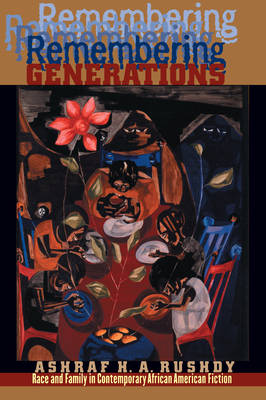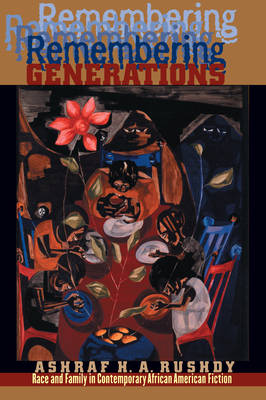
- Afhalen na 1 uur in een winkel met voorraad
- Gratis thuislevering in België vanaf € 30
- Ruim aanbod met 7 miljoen producten
- Afhalen na 1 uur in een winkel met voorraad
- Gratis thuislevering in België vanaf € 30
- Ruim aanbod met 7 miljoen producten
Zoeken
Remembering Generations
Race and Family in Contemporary African American Fiction
Ashraf H a Rushdy
Paperback | Engels
€ 64,95
+ 129 punten
Omschrijving
Slavery is America's family secret, a partially hidden phantom that continues to haunt our national imagination. Remembering Generations explores how three contemporary African American writers artistically represent this notion in novels about the enduring effects of slavery on the descendants of slaves in the post-civil rights era.
Focusing on Gayl Jones's Corregidora (1975), David Bradley's The Chaneysville Incident (1981), and Octavia Butler's Kindred (1979), Ashraf Rushdy situates these works in their cultural moment of production, highlighting the ways in which they respond to contemporary debates about race and family. Tracing the evolution of this literary form, he considers such works as Edward Ball's Slaves in the Family (1998), in which descendants of slaveholders expose the family secrets of their ancestors.
Remembering Generations examines how cultural works contribute to social debates, how a particular representational form emerges out of a specific historical epoch, and how some contemporary intellectuals meditate on the issue of historical responsibility--of recognizing that the slave past continues to exert an influence on contemporary American society.
Focusing on Gayl Jones's Corregidora (1975), David Bradley's The Chaneysville Incident (1981), and Octavia Butler's Kindred (1979), Ashraf Rushdy situates these works in their cultural moment of production, highlighting the ways in which they respond to contemporary debates about race and family. Tracing the evolution of this literary form, he considers such works as Edward Ball's Slaves in the Family (1998), in which descendants of slaveholders expose the family secrets of their ancestors.
Remembering Generations examines how cultural works contribute to social debates, how a particular representational form emerges out of a specific historical epoch, and how some contemporary intellectuals meditate on the issue of historical responsibility--of recognizing that the slave past continues to exert an influence on contemporary American society.
Specificaties
Betrokkenen
- Auteur(s):
- Uitgeverij:
Inhoud
- Aantal bladzijden:
- 224
- Taal:
- Engels
Eigenschappen
- Productcode (EAN):
- 9780807849170
- Verschijningsdatum:
- 26/03/2001
- Uitvoering:
- Paperback
- Formaat:
- Trade paperback (VS)
- Afmetingen:
- 156 mm x 234 mm
- Gewicht:
- 349 g

Alleen bij Standaard Boekhandel
+ 129 punten op je klantenkaart van Standaard Boekhandel
Beoordelingen
We publiceren alleen reviews die voldoen aan de voorwaarden voor reviews. Bekijk onze voorwaarden voor reviews.











